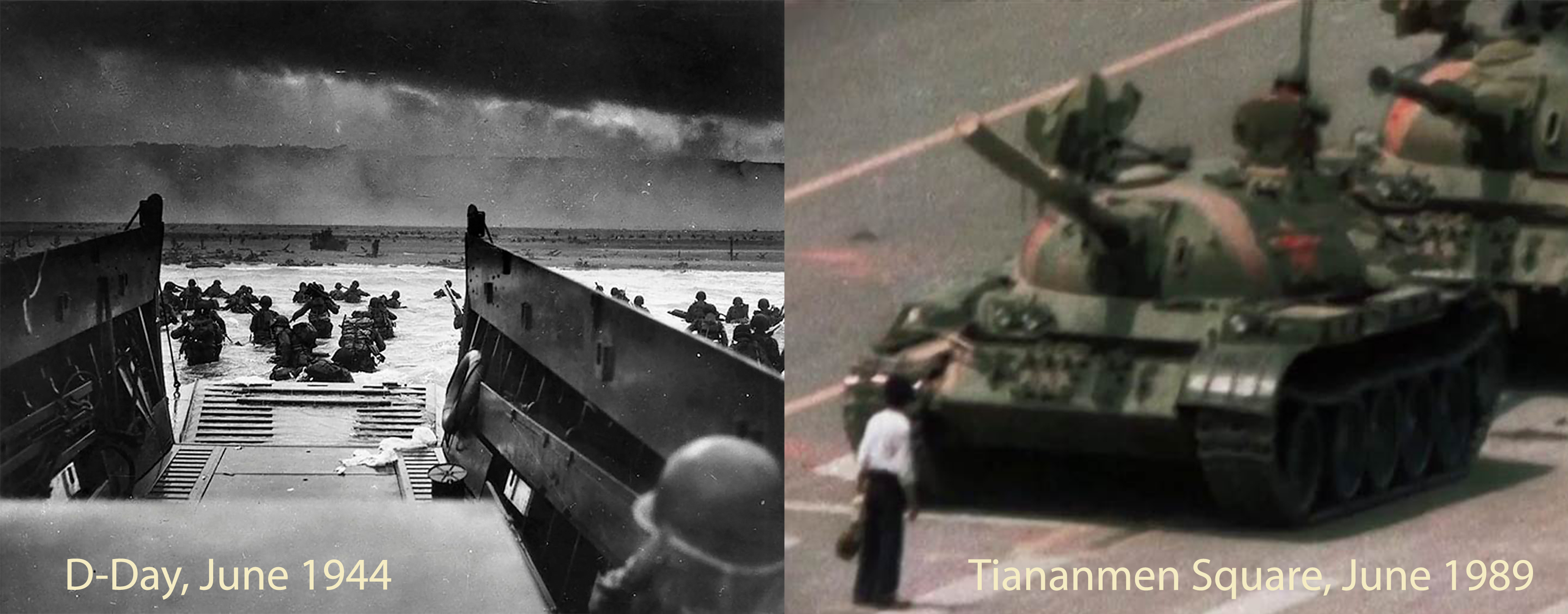Remembering D-Day and Tiananmen Square
This week, we mark two very different milestones: the 75th anniversary of D-Day, June 6, 1944, the allied invasion of Nazi-controlled Europe; and the 30th anniversary of the Tiananmen Square Massacre on June 4, 1989. How these days are marked and remembered tells us a lot about the difference between democracy and autocracy.
Earlier this week, a friend pointed out that D-Day is perhaps the most celebrated, fictionalized, and talked about battle in American history. From feature films like “The Longest Day” and “Saving Private Ryan” to video games like “Medal of Honor” and “Call of Duty,” the story of D-Day and the valor of those who stormed Hitler’s Atlantic Wall is something understood broadly, by multiple generations.
President Reagan’s speech on the 40th anniversary of the invasion celebrated the Army Rangers who scaled the cliffs at Pointe du Hoc in the face of withering fire from German forces above. The president noted the moral energy that fuels an army fighting to liberate rather than conquer. Then, to the assembled veterans of the assault, Reagan said: “You all knew that some things are worth dying for. One’s country is worth dying for, and democracy is worth dying for, because it’s the most deeply honorable form of government ever devised by man. All of you loved liberty. All of you were willing to fight tyranny, and you knew the people of your countries were behind you.”
In 1989, other people separated from D-Day by time and distance, in Tiananmen Square, Beijing, had been protesting since mid-April, calling for increased freedom and even democratization in China. They, too, were willing to fight tyranny. They, too, loved the idea of liberty. And yes, they, too, died for democracy when their own government sent tank columns against unarmed protesters and students, killing hundreds and potentially thousands of peaceful activists.
But where the nations of the West venerate the courage of June 6, 1944, the events of June 4, 1989, in Tiananmen Square have been stricken from China’s official history. Students in China don’t learn about 1989’s pro-democracy protests in school and there are certainly no public commemorations of the sacrifice those protesters made, or the courage they displayed against impossible odds. In fact, the Chinese government is actively censoring any efforts online to remember the events of that day. According to VICE News, “at least 27 activists, artists, and netizens . . . have been detained, questioned or disappeared since the start of May” for posting items online about the Tiananmen Square crack-down. Even Western news agencies trying to report on the anniversary have had their content blocked by China’s “Great Firewall,” and CNN’s Matt Rivers was harassed on camera while trying to report on the anniversary live from Beijing.
In the West, we celebrate D-Day because it is a testament to our finest qualities and the possibilities of what free people can accomplish when they work together. In China, the censorship around Tiananmen Square is a sure sign of weakness, of a brittle regime that does not trust its own citizens with the truth, who turned its guns on students rather than risk losing its grip on power.
In 1938, Americans celebrated the 75th anniversary of the Battle of Gettysburg. It was the last major celebration of that turning point in America’s Civil War. It’s believed that 25 veterans of the battle made it to the encampment. Only a few more D-Day veterans, 35 to be precise, are expected in Normandy this year. But even with the eventual passing of that generation, the legacy and the meaning of D-Day will live on, just as Gettysburg did, because it is a historical moment whose salience has been captured by the culture. We won’t forget D-Day because D-Day helps us define ourselves and we like what it tells us about who we are.
In China, however, officials seek to edit history, to wipe an event from memory, and to pretend it never happened. Why? Because that moment defines the regime in China to this day, and the authoritarians who run China don’t like what that legacy reveals about them and their regime.

